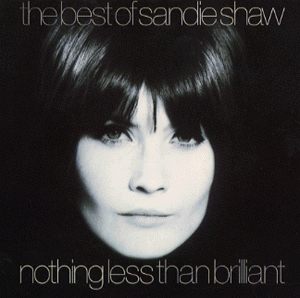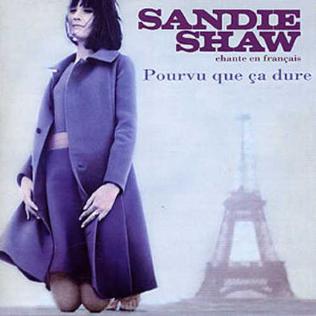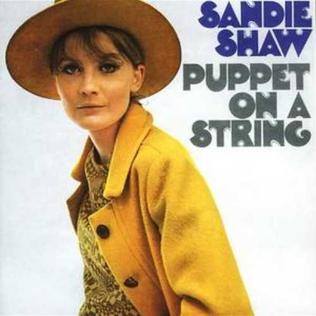
The Honeycombs were an English beat group, founded in 1963 in North London, best known for their chart-topping 1964 hit, the million selling "Have I the Right?" The band featured Honey Lantree on drums, one of the few female drummers in bands at that time. They were unable to replicate the success of the first single and had disbanded by 1967.

Sandie is the first album by the British pop singer Sandie Shaw. Released in February 1965 on the Pye label, it was her only original album to enter the UK Albums Chart and peaked at Number 3. In the few months prior to the album's release, Shaw had scored two major hits with the Bacharach/David-penned "(There's) Always Something There to Remind Me" and Chris Andrews's "Girl Don't Come"; although neither track was included on this album.

Me is the second album by the British girl singer Sandie Shaw. It was released by Pye Records in November 1965, eight months after her debut, but was not as commercially successful - although her singles were still selling well. Since the release of the Sandie album, Shaw had gained another three UK Top 10 hits - "I'll Stop at Nothing," the number one "Long Live Love" and "Message Understood," all of which had been written by Chris Andrews. As with the previous album, Me contained a mixture of Andrews-penned material and cover versions of songs by other artists, as well as a track written by Shaw herself. However the balance of original and remade material was different this time - half of the twelve tracks were written by Andrews, as opposed to the third on Sandie, one track by Shaw, and five songs by other artists. Me was later re-issued as a package with Sandie on CD in the 1990s on the RPM label, and then again in digitally remastered format by EMI in 2005 with bonus French versions of "Down Dismal Ways" and "Too Bad You Don't Want Me".

The Very Best of Sandie Shaw is a compilation album by the British singer Sandie Shaw. Released in 2005 by EMI, it contained digitally remastered versions of all her most popular hit singles from 1964 to 1988. It was the first compilation to feature the original recordings of all her UK chart hits.

Nothing Less Than Brilliant is a compilation album by the British singer Sandie Shaw. Released in 1994 by Virgin Records, it contains several new recordings of her hit singles from the 1960s as well as some in their original forms. It also featured some songs recorded in the 1980s.

Christopher Frederick Andrews is an English-German singer-songwriter whose musical career started in the late 1950s.

"Hand in Glove" is the debut single by English rock band the Smiths, written by singer Morrissey and guitarist Johnny Marr. It was released in May 1983 on independent record label Rough Trade. It peaked at No. 3 on the UK Indie Chart but did not make the top 75 of the UK Singles Chart, settling outside at No. 124.
"(There's) Always Something There to Remind Me" is a song written in the 1960s by songwriting team Burt Bacharach and Hal David. Originally recorded as a demo by Dionne Warwick in 1963, "(There's) Always Something There to Remind Me" first charted for Lou Johnson, whose version reached No. 49 on the Billboard Hot 100 in the summer of 1964. Sandie Shaw took the song to No. 1 in the UK that same year, while the duo Naked Eyes had a No. 8 hit with the song in the US two decades later in 1983.
"Girl Don't Come" is a song, written by Chris Andrews that was a No. 3 UK hit in the UK Singles Chart for Sandie Shaw in 1964–65.

Pourvu que ça dure – Chante en Français is a compilation album by the British singer Sandie Shaw, containing a selection of French-language recordings of some of her original hits. It was released in 2003 by EMI.

La cantante scalza - Sandie Shaw canta in italiano is an album by the British singer Sandie Shaw, and features a compilation of her hits recorded in the Italian language. It was released by EMI in 2003.

The Collection is a compilation album by the British singer Sandie Shaw, which was released in 2007 shortly after her 60th birthday. Released as a budget-priced album by EMI, it contained mostly recordings from the 1960s including A-sides, B-sides, album tracks plus two exclusive foreign language songs.

Puppet on a String is Sandie Shaw's third full-priced album, released on the Pye label in May 1967 on the back of her Eurovision success.
Lou Johnson was an American soul singer and pianist who was active as a recording artist in the 1960s and early 1970s.

Sandie Shaw, is a retired English singer. One of the most successful British female singers of the 1960s, she had three UK number one singles with "(There's) Always Something There to Remind Me" (1964), "Long Live Love" (1965) and "Puppet on a String" (1967). With the latter, she became the first British entry to win the Eurovision Song Contest. She returned to the UK Top 40, for the first time in 15 years, with her 1984 cover of the Smiths song "Hand in Glove". Shaw retired from the music industry in 2013.
Pop Go The 60s! was a one-off, 75-minute TV special originally broadcast in colour on 31 December 1969, to celebrate the major pop hits of the 1960s. The show was a co-production between the United Kingdom's BBC and West Germany's ZDF broadcasters. The latter showed it on 18 January 1970 under the title "Schlag auf Schlagers". Although a co-production, it was primarily produced by the BBC and recorded at the BBC's Television Centre in London, in late 1969, featuring largely only British pop acts and hits.

+ is the debut studio album by English singer-songwriter Ed Sheeran. It was released on 9 September 2011 by Asylum Records and Atlantic Records. The album is considered Sheeran's commercial breakthrough. He previously released five EPs independently. Jake Gosling and Sheeran produced the majority of the album, with additional production by American hip hop producer No I.D.
This is the discography for the British pop singer Sandie Shaw.

Love Me, Please Love Me is the 1966 debut album by French singer-songwriter Michel Polnareff. It was known originally as the self-titled album Michel Polnareff, but was identified later by the title song "Love Me, Please Love Me".

"Leave Me Be" is a song written by British bassist Chris White and recorded by his band the Zombies. Following the release of their debut single "She's Not There" in July 1964, White wrote a handful of songs in between performances during the band's heavy schedule. Most of the work on the song occurred in August 1964, when the Zombies recorded both a demo and the backing track for it. The instrumentation largely differs from both earlier and later Zombies records; it features electric organ played by Rod Argent, compared to his previous usage of the electric piano. Together with record producer Ken Jones, they returned in September to finish the vocal track, which was disliked by most band members for its similarity to "She's Not There"; the vocals would eventually be re-recorded a few months later.















